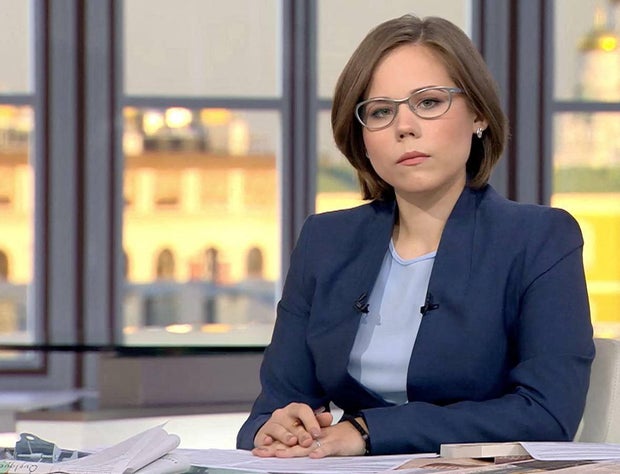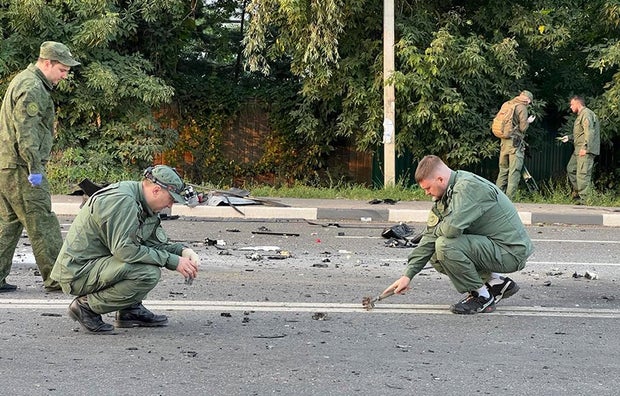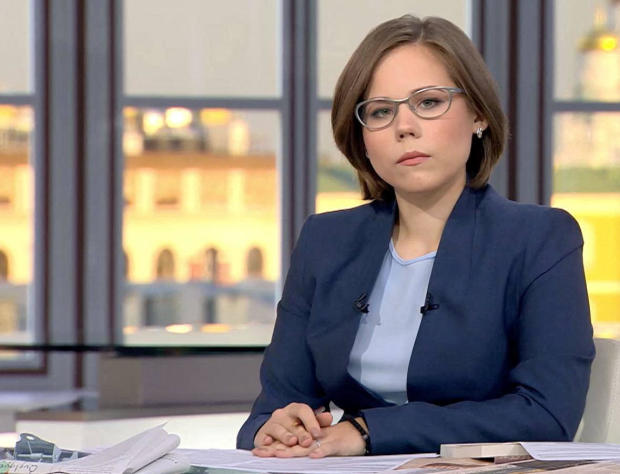Moscow — The daughter of an influential Russian political theorist who is often referred to as “Putin’s brain” was killed in a car bombing on the outskirts of Moscow, officials said Sunday.
The Moscow branch of the Russian Investigative Committee said preliminary information indicated a bomb planted in the SUV driven by Daria Dugina, 29, exploded Saturday night and killed the TV commentator who was the daughter of Alexander Dugin, a nationalist philosopher and writer.
Dugin is a prominent proponent of the “Russian world” concept, a spiritual and political ideology that emphasizes traditional values, restoration of Russia’s power and the unity of all ethnic Russians throughout the world. He also is a vehement supporter of Russia sending troops into Ukraine.
The explosion took place as his daughter was returning from a cultural festival she had attended with him. Some Russian media reports cited witnesses as saying the SUV belonged to Dugin and that he had decided at the last minute to travel in another vehicle.

TSARGRAD.TV via Reuters
The vivid and violent incident, unusual for Moscow, is likely to aggravate Russia-Ukraine animosity.
Denis Pushilin, president of the separatist Donetsk People’s Republic that is a focus of Russia’s fighting in Ukraine, blamed it on “terrorists of the Ukrainian regime, trying to kill Alexander Dugin.”
Mykhailo Podolyak, an adviser to Ukrainian President Volodymyr Zelenskyy, denied Ukrainian involvement, saying on national TV that “We are not a criminal state, unlike Russia, and definitely not a terrorist state.”
Analyst Sergei Markov, a former Putin adviser, told Russian state news agency RIA-Novosti that Alexander Dugin, not his daughter, likely was the intended target and said “it’s completely obvious that the most probable suspects are Ukrainian military intelligence and the Ukrainian Security Service.”
While Dugin’s exact ties to Russian President Vladimir Putin are unclear, the Kremlin frequently echoes rhetoric from his writings and appearances on Russian state TV. He helped popularize the “Novorossiya,” or New Russia, concept that Russia used to justify the 2014 annexation of Ukraine’s Crimea and its support of separatist rebels in eastern Ukraine.
He promotes Russia as a country of piety, traditional values and authoritarian leadership, and disdains Western liberal values.
His daughter expressed similar views and had appeared as a commentator on the nationalist TV channel Tsargrad, where Dugin had served as chief editor.

Investigative Committee of Russia via AP
Dugina herself was sanctioned by the United States in March for her work as chief editor of United World International, a website that the U.S. described as a disinformation site. The sanctions announcement cited a UWI article this year that contended Ukraine would “perish” if it were admitted to NATO.
“Dasha, like her father, has always been at the forefront of confrontation with the West,” Tsargrad said on Sunday, using the familiar form of her name.
In his 1997 book, “The Foundations of Geopolitics,” Dugin laid out an ideology called Eurasianism. The idea suggests that Russia, uniquely positioned between Europe and Asia, is unassimilable within Western civilization. Instead, Dugin thinks Russia should embrace its geopolitical distinctiveness and dominate both spheres, uniting Europe and Asia into one great empire ruled by ethnic Russians. Dugin has set Eurasianism in direct opposition to liberalism and the whole “Atlantic” world he believes is led by the United States.
“Ukraine as an independent state with certain territorial ambitions represents an enormous danger for all of Eurasia and, without resolving the Ukrainian problem, it is, in general, senseless to speak about continental politics,” Dugin wrote in his 1997 book.
Dugin remained steadfast that subsuming Ukraine was the only path forward for Russia after the Russian invasion.
“Without Ukraine, Russia cannot become once more the empire,” Dugin said in a video posted to Telegram in March. “With Ukraine inside of Russia zone of control, it will become empire once more.”
In a 2017 interview with Dugin, “60 Minutes” correspondent Lesley Stahl pointed out to him that Putin seems to have listened to all his recommendations. Not only had Dugin called for Russia to annex Ukraine, which Russia first did in Crimea in 2014, but Dugin had also suggested that Russia make Iran an ally and encourage Britain to leave the European Union.
Dugin rebuffed the suggestion that Putin is following his blueprint. He pointed out that his policy prescriptions were decades old, and that Putin was only just now fulfilling the first steps.
“We demand from him to be much more authoritarian than he is,” Dugin told Stahl. “So he a little bit disappoints us because it [takes] too long.”
